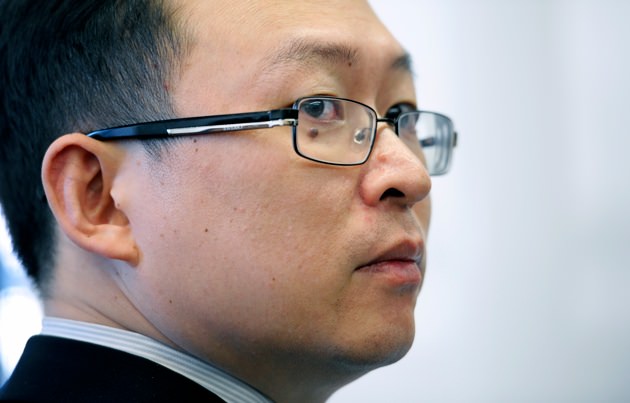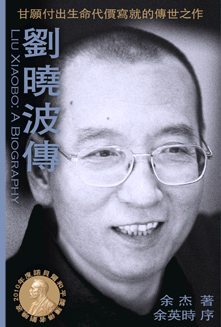Yu Jie is one of China’s most prominent essayists and critics, with more than thirty books to his name. His latest work is a biography of his friend, Nobel Peace Prize laureate Liu Xiaobo, that was published in Chinese in Hong Kong a few weeks ago. It is not the first time he has stirred up controversy in China. Yu first gained fame in 1998 at age twenty-five for his book Fire and Ice, a series of biting, satirical essays on contemporary society. Within two years, he was already blacklisted by most publishers. An intensely moralistic person, he also angered many Chinese intellectuals for arguing that they failed to match actions to words.
In 2003, Yu converted to Christianity and increasingly complemented his provocative writing with political activism of his own. He was an early signer of Charter 08, the landmark human rights manifesto, and in 2010 cemented his position as a leading political critic by writing a biography of Chinese Premier Wen Jiabao in which he refers to his subject as “China’s best actor.” Last year, Yu completed a rough draft of his biography of Liu Xiaobo, who is now serving an eleven-year prison sentence. Authorities warned Yu that he too would be jailed if the book was published and put him under house arrest for several months. In January, he fled China with his wife and son for the United States, where he now resides.
I spoke to Mr. Yu at a church in the Washington area.
Ian Johnson: How did you get to know Liu Xiaobo?
Yu Jie: In 1998 my first book came out and he was in jail. His wife thought that he should see what young people were thinking. Young people were becoming critical and so she took it to him in prison. He had a lot of criticisms—and in fact my thinking then wasn’t too clear. But [the writer] Liao Yiwu was friends with Liu and very good friends with me. When Liu got out of jail, Liao thought it was a pity that we shouldn’t be friends so he introduced us to each other. We got along well from the start and we’d meet every two weeks or so. Our wives were also close friends.
After he was arrested, you decided to write the biography. What was your motivation?
I want to explain his ideas. Not many know his work.
But some Western scholars know about Liu.
Less than you would think. Andrew Nathan (of Columbia University) knows about him and Geremie Barmé wrote a great essay on him. But few do. It’s a strange situation.
In the West, if people know anything, they might think of him as conservative. For example, he supported Reagan and, later, George W. Bush’s Iraq War. He was very similar in many ways to the Republicans. I felt I had to write this and explain his thinking and show why he’s like that. Why did he support the Iraq war? You can’t just put him in the European environment and say that everyone who supported that war was a bad person.
He thought of the war as an extension of his opposition to dictatorships.
Yes, and he wasn’t alone. Havel also supported it, and Michnik too. So there are very confusing issues and they can’t be simplified. But I want to make him a living person, not a god. Liu Xiaobo had a lot of problems. He had a lot of girlfriends—that’s in the book too. After my son was born he talked to me about the effect of my work on my family. In 1989 his own son was six years old. Now that son is twenty-nine or so and lives in California but the family split and they never had anything to do with each other again.
So Liu Xiaobo talked to me about these things and how much pain all this had caused him. He later remarried but decided never to have another child because he didn’t want a child to have that kind of a life. I thought of this when writing his biography. A top public security official told me that if you write this you’ll be in big trouble. It’s the main reason I left China. I have a wife and ten-year-old child and couldn’t take the risk of hurting them. I wanted them to have a normal life.
How would you describe his ideas?
He’s similar to [Soviet dissident Andrei] Sakharov. He’s not just a critic of communism but also someone who promotes virtues and values. This is an important point because there are a lot of people who criticize the communists. Liu Xiaobo also has a constructive ideology too. That line—”I have no enemies”—is really important. It’s similar to Mandela. You look at how many problems blacks in South Africa had. It could have resulted in a lot of hatred, but Mandela tried to reconcile people, and I see Liu like that too.
Advertisement
China doesn’t have apartheid.
No, China doesn’t have the racial component perhaps quite as much but it has fault lines, for example between country and city. The way that rural laborers are treated in the cities is similar to how blacks were treated in South Africa. If you don’t have an ideology like Liu’s to push for peaceful change, then change could result in violence.
For example, I see a big difference between him and Ai Weiwei. Western society is really interested in Ai. A lot of Western media write about Ai and gives him a place of importance. There’s a new movie about him too. I don’t think he is so important. He is an established artist and he has many theatrical actions that the media like to report about. I do strongly support some of the things he’s done, like the [accounting for the dead in the 2008 Sichuan] earthquake but a lot of his thoughts have problems.
Such as?
There’s an example, and here Liu Xiaobo and I are in complete agreement, there was the case of Yang Jia. He killed some police officers in Shanghai. Ai Weiwei thought Yang Jia was a great hero. He really supported him and said it was understandable given what Yang had suffered. But Liu Xiaobo and I were among the few who said this was wrong. Yang had been wronged but it didn’t justify killing and the people he had killed weren’t even the ones who had hurt him.
Maybe China needs different kinds of people. It needs people like Ai to provoke.
Perhaps, but if you’re comparing them, then Liu Xiaobo is much more important. He has a constructive side to his thinking. I think the Western media should report more on Liu and less on people like Ai. They place them on too high a pedestal.
Liu is in prison of course, so that makes it hard. It also must have made it hard to report your book. How did you research it?
I talked to over thirty people. I traveled up to China’s northeast, where Liu is from, and got a lot of material. When I started in 2009 it was easy and I could move freely, but by the end it was impossible to meet people. People were being warned not to talk to me and so there are many people I couldn’t talk to. But I have enough. Maybe I have too much! The book is 400,000 characters, so I guess that’s about 500,000 or more words.
You yourself come from Chengdu, the capital of Sichuan Province in southwest China, which is home to Liao Yiwu, Ran Yunfei and other prominent authors and critics. Even though you left when you were eighteen to study at Peking University, did you stay in touch with this circle?
They are all my good friends and I often went back to talk to them. Sichuan is located in a border area so it’s far from the influences of mainstream Chinese culture. It’s also in a basin and cut off by mountains, so it is protected from Beijing’s influence. The most critical thinkers are in Beijing but next is Chengdu and then Guangzhou. Mainly there are those three cities. Shanghai likes to think it’s such an important city but doesn’t have many critical thinkers.
Your Christianity is part of your political consciousness. Why is that?
Over the past hundred years, China has studied a lot from the West but we haven’t studied the link between faith and liberty. Chinese have mainly learned from France and Germany: from France, the French Revolution, and from Germany, of course Marx and nationalism, which came to us via Japan. And from Russia we learned Leninism. But we haven’t learned much from this British-American tradition. Even in the early twentieth century we didn’t look very closely at the relationship between the political system and faith. Hu Shih, for example, never talked about the link between the separation of powers and religion. I think it’s only with our generation that we’re starting to think about this. One of the basic points is that the liberty to choose is God-given—not given by the state but by God. This means it’s higher than the state. It’s the foundation of Western democracy but many Chinese don’t understand this.
Advertisement
You’re also publishing a series of books on Chinese Christian leaders.
Chinese churches need to develop more democratic institutions. In the West, [Protestant] churches are run by committees; they are like small parliaments that are elected, just like the governments. Chinese congregations don’t know about this, so I wanted to show them. I think there will be a big change in China in the next ten or twenty years and at that point there will be some sort of religious freedom. So the bigger issue is how the congregations will manage themselves. Will they be democratically organized? Will they have a strong theological foundations? Or will they remain a new form of Chinese folk religion, a movement like the Boxers with a new foreign name plate?




